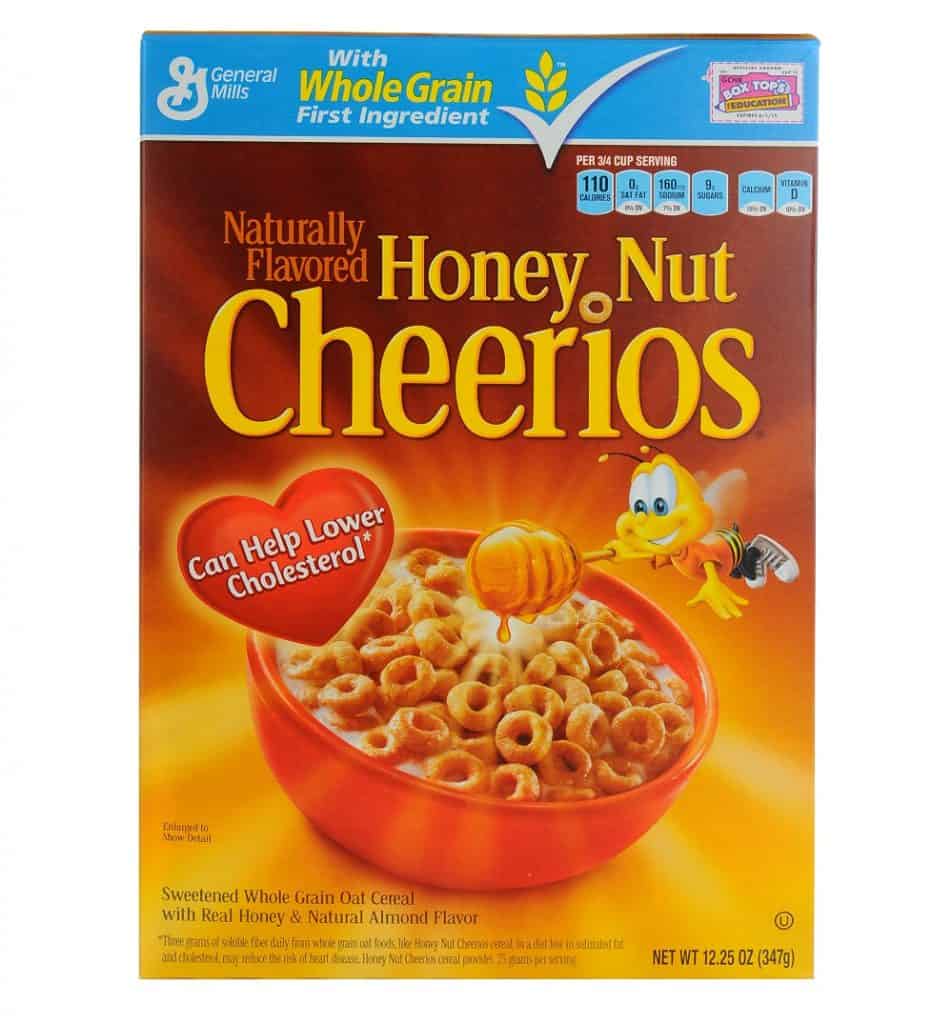Honey Nut Cheerios is a popular variation of the classic Cheerios breakfast cereal manufactured by General Mills, the same company responsible for many popular brands such as Betty Crocker, Pillsbury, Haagen-Dazs, Cocoa Puffs, and Lucky Charms. First created back in 1979, Honey Nut Cheerios are highly popular in the US and are considered to be among the best-selling cereals in the country (1).
Unfortunately, Honey Nut Cheerios are non-vegan right away due to the presence of honey. Honey is a common sweetener derived from honeybees and beekeeping, a practice that is problematic for both ethical and environmental vegans. Furthermore, Honey Nut Cheerios also contain sugar which is a common gray area ingredient. The cereal brand is also fortified with vitamins including vitamin D3, a vitamin that is highly likely to be produced using sheep’s wool.
Table of Contents
Are Honey Nut Cheerios Vegan?

Honey Nut Cheerios cannot be considered vegan because it uses real honey. Honey is produced by bees which means it is an animal-derived product. Aside from the exploitation of honeybees for honey production, beekeeping has also been considered to be environmentally problematic as large honeybee farms can cause local competition with the native bee species.
Aside from honey, Honey Nut Cheerios also have other problematic ingredients, namely sugar and vitamin D3. Firstly, sugar is a commonly debated ingredient because of the uncertainty of whether bone char was involved in its production. If bone char is involved, then the sugar produced cannot be considered vegan. However, it is a gray area ingredient because of the difficulty in determining so.
Vitamin D3, an active form of vitamin D, is also a problem. This is a common problem for many vitamin-fortified breakfast cereals. While vitamins are indeed beneficial for good health, the majority of commercially produced vitamin D is not vegan as the raw material for its production is sheep’s wool. Although vegan alternatives are available, this is currently the standard for commercial vitamin D production.
Honey Nut Cheerios Ingredients List
The list of ingredients of Honey Nut Cheerios includes (2): whole grain oats, sugar, oat bran, corn starch, honey, brown sugar syrup, salt, tripotassium phosphate, rice bran oil and/or canola oil, natural almond flavor. Vitamin E (mixed tocopherols) added to preserve freshness.
Vitamins and minerals: calcium carbonate, zinc and iron (mineral nutrients), vitamin C (sodium ascorbate), a vitamin B (niacinamide), vitamin B6 (pyridoxine hydrochloride), vitamin B2 (riboflavin), vitamin B1 (thiamin mononitrate), vitamin A (palmitate), a B vitamin (folic acid), vitamin B12, vitamin D3.
Honey
Honey is a common sweetener and is often used as a healthier alternative to sugar. Unlike table sugar, which is made of sucrose honey is composed of sweet monosaccharides such as fructose and glucose. Aside from its wide use in cooking, honey is also the principal ingredient in mead –an alcoholic honey wine that is estimated to be one of the oldest fermented beverages. Honey is also highly popular due to the fact that microorganisms cannot grow in it and it is said that this food item does not spoil.
However, honey is totally non-vegan. Compared to table sugar which is derived from plant sources, honey is derived from an animal source – bees. Hence, honey cannot be considered vegan.
Bees produce honey by collecting vast amounts of sugar-rich nectar and honeydew. These high-carbohydrate sources fill a special compartment inside the bee where they eventually become converted into honey. Bees then regurgitate honey back inside the beehive where it is stored for later consumption and for larval feeding.
The practice of beekeeping for honey production is considered to be non-vegan as it involves the exploitation of animals (3). This is especially concerning since bees produce honey to feed themselves and their hive. Thus, collecting honey is similar to stealing their food.
Furthermore, beekeeping has been listed to be an environmental risk. Keeping large amounts of honeybees in one particular area creates high competition with the native bee species. If the honeybees are in high enough quantities, they can eventually starve out the local species which can cause problems for the pollination of certain plant species that only the local bees were attracted to. This factor leads to the assertion that beekeeping is not only against ethical veganism due to the exploitation of bees, but is also against environmental veganism.
Sugar
Sugar is a common sweetener used in the food industry and is a heavily prevalent ingredient in breakfast cereal food items. Sugar is typically derived from a plant source such as sugarcane or sugar beets. However, its floral source is not enough to truly consider sugar to be vegan these days. Unfortunately, sugar can become classified as non-vegan depending on how it is produced.
Food companies always want to make their products more appealing to the consumers, a notion that extends to the sugar companies. These sugar companies often further refine their sugar to make it more appealing. These additional processes can make the sugar whiter and finer. There are many processes that can be used to further refine sugar but one in particular is filtration.
Different sugar companies use different filtration methods. One such effective method is to use granulated carbon. However, the issue with sugar refinement is that some companies use bone char – the charred and ground-up bones of animals (4). Although bone char is a highly effective filter, it is an animal product. Thus, sugar that has been filtered with the use of bone char can no longer be considered vegan.
One problem with the use of bone char is that it is only one of many different processes used in the sugar industry which means not all companies use them. This makes it difficult to track which companies do. Furthermore, large food companies such as General Mills can have multiple sources for sugar which means the sugar they use can come from different sugar companies. This makes it even more difficult to determine if the sugar used in Honey Nut Cheerios comes from companies that use bone char or not. This uncertainty is the reason why sugar is commonly considered a gray area ingredient.
This issue is more prevalent in the US since the practice of using bone char is more common there. Vegans in other parts of the world are less concerned with the vegan status of their locally-produced sugar.
Vitamin D
Vitamins are micronutrients which means they are needed by the body in little amounts to properly function. This is in contrast to macronutrients such as carbohydrates, lipids, and fats that the body requires in large amounts for energy and growth. There are different kinds of vitamins and each is attributed to serving specific functions in the body. One vitamin in particular is called vitamin D and it is currently a big issue in the vegan community.
Most vitamins have to be acquired through the diet. Fortunately, many food items from nature such as fruits and vegetables are naturally high in different vitamins. Vitamin D can also be acquired through the diet but it is unique in the sense that the human body can actually produce it on its own. With the energy from the sun, UV radiation is able to convert a cholesterol in the skin which is then converted into an active form of vitamin D in the liver. Despite this ability, many people still benefit from food sources for their vitamin D requirements.
Vitamins are almost always welcome in vegan diets. However, the issue with vitamin D is that it is a common understanding that the vast majority of commercially produced vitamin D involves the use of an animal product. Historically, vitamin D used to be produced using brains, spinal cords, and livers. Nowadays, the most cost-effective way to produce vitamin D is to use sheep’s wool. Grease from sheep’s wool is used to extract a cholesterol which is then further converted into vitamin D (5).
There are vegan sources for vitamin D. Some companies extract vitamin D biotechnologically using lichens. Some companies are also looking into fully synthetic vitamin D. However, it is difficult to neglect that the current standard for commercial vitamin D production is non-vegan. Thus, food fortified with vitamin D is unlikely to be truly vegan.
References




